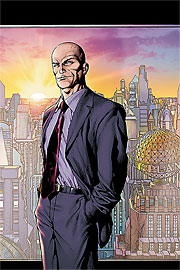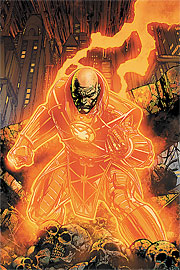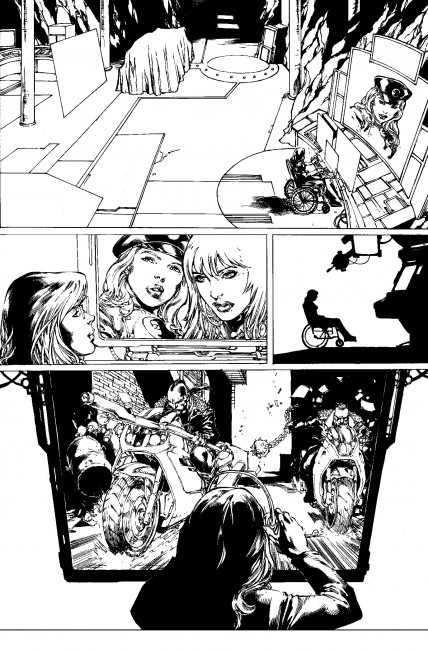A large part of the appeal of superheroes is the ongoing narrative. Like soap operas, wrestling, and movie franchises, people like to drop in and see what’s going on with a character. While there are Elseworlds, What Ifs, dreams, alternate universes, and house shows, there’s a clear series of stories that are “real.” You can trace the biography of Clark Kent from 1938 to 2010, and buy books that tell that story from the beginning. Regular reinventions re-tell his origin, but with rotary phones replaced with touchtone phones, and then newspapers replaced by the internet, and then the internet replaced by newspapers again.
This has expanded from a biography into a mythology. It’s not enough to have Clark Kent from ’39 to ’10. You need to know Clark Kent’s place in the DC Universe, and how he relates to thousands of other characters. There is a narrative, whether on a small scale or a macro scale, that you can follow from A-Z. Superman died [mumble] years ago and this is how it affected Blue Beetle. Peter Parker fought Norman Osborn in college, and here is how that affects the Marvel Universe. Stories that do not fit into that narrative are either handwaved away in favor of the new interpretation of the character or deprecated and consigned to the realm of “imaginary stories.”
The idea of “real” stories is one that Marvel and DC both have wholly embraced. It is the stuff that runs in the veins of big events, and the reason why comics fans claim that they hate events but buy them anyway. “I want to know what happens! This matters!” You want that next chapter in the ongoing story, you need to know what happens to Peter Parker in Civil War, and you want to know the effects of Secret Invasion on the greater Marvel Universe. You’re invested in the narrative.
That investment leads to the immediacy that drives the direct market. You can go to the comic shop every week and get an update on whichever universe you prefer. If you don’t have that immediacy, that lust for the periodical, you have no reason to hit a comic shop and can just order the completed stories a few months down the line and read them at your leisure. DC’s recently stated wish to push back against trade waiters and emphasize the monthly comics (a move I find, frankly, idiotic and backwards) is their latest attempt to maintain their stranglehold on that market. These are the lifers, the ones who go in, buy their comics, complain, and buy them again the next month.
Series that don’t tie into the narrative sink like rocks. Barring aberrations like Deadpool’s current status, who ride a bubble of interest until it fizzles out, anecdotal knowledge says that niche books don’t sell. Recent casualties: Blade, Blue Beetle, Captain Britain & MI-13, SWORD, and Brother Voodoo. Books like Runaways and Agents of Atlas are repeatedly relaunched, repositioned, and revamped in an attempt to keep readers. Runaways in particular was changed to tie directly into the greater Marvel Universe for its second volume.
Those books get cancelled because retailers know that readers want important stories, so they order accordingly. Who cares what happened in Runaways? Is Spider-Man even in that? And The Mighty? Who is that? Is Green Lantern ever gonna guest star? “Save ______” campaigns, barring the amazing dedication of Spider-Girl fans, rarely work. The books get resurrected, retailers order a couple extra copies at best, since the last series failed, and then we’re left right back where we started: “Save ______.”
Simple question: why? Why are the books that are “real” considered more “real” than the others? In the end, the only thing you get out of reading a “real” story is a different set of fake information about a fake character. Both results are equally fake. You think somebody who only ever watched The Dark Knight cares that Batman once fought a dude with eyeballs where his fingertips go? Or that Spider-Man getting married matters more than that time Venom drove a truck in the Spider-Man cartoon? No, because here is the truth: all stories are fake stories. Granted, there is a certain amount of pleasure in following a character’s ongoing adventures, but let’s be real: all stories are fake stories. Being part of a string of fake stories doesn’t make it any more real than the other fake story.
So, why is Amazing Spider-Man more real than Spider-Man Noir? Easy: Marvel says so. Or DC says so. Or whoever. They have a vested interest in keeping their captive audience, for lack of a better phrase, so they maintain something approaching a canon, a group of stories that are “real.” Those other stories, Elseworlds and What Ifs and whatever, are fake, and you don’t need them to know what’s going on. If you buy them, that’s great, but look–Siege is what you need. Buy Green Lantern because it’s important.
My least favorite question in comics is “Is this in continuity?” That’s a frustrating question, especially when recommending a book to someone. There is the implication that stories that are in continuity matter more than ones that don’t, when that is undeniably false. I read Spider-Man comics for a few years without ever picking up Amazing Spider-Man.
Nowadays, I think the thrice-weekly Amazing Spider-Man is a great book, one of the most consistently good cape books on the stands. It has had its low points, its dips in quality, but the overall package is good. Last January, it was moving about sixty thousand units.
Spider-Man Noir is honestly one of my favorite Spider-Man stories. The writing was on point, the art was excellent, and it all came together very well. As far as Spidey stories go, it hits all the notes to make it a classic. It shipped thirty-one thousand copies.
Why the discrepancy? One is real, the other is not.
The problem with this system is that quality does not matter. Avengers Disassembled and Ultimatum were deck-clearing exercises. Everyone hated Spider-Man: One More Day, but it sold 150k. Identity Crisis was a terrible mystery and Blackest Night ended when a ghost popped up in the last issue and told everyone how to beat the bad guy. But, since these books are important, they sold gangbusters. Add a logo or a banner to a low-selling comic, script a tie-in to the important event, and watch the sales jump while people see what’s going on with the greater continuity. And then watch them fall once the continuity cop stuff is over.
Death to canon.
I hate the way it’s used in comics. Rather than having stories that matter, treat every story like it matters, Elseworlds or no. You can still do the ground-shaking status quo events, you can do sequels, and you can do long-running series. In fact, the way Marvel collects its events already does this. If you go to the store to buy Annihilation, you have Annihilation Book One, Annihilation Book Two, and Annihilation Book Three. They contain several stories from a variety of writers, but all tell the story of the Annihilation Wave. House of M has been collected into several softcovers. And in the bookstore, these books do not have any primacy over Spider-Man Noir or Agents of Atlas.
What’s important is the story and the creators. Not the canon, not the format, not the wrapper, not the company that made it. The story and the people who created it are the only ones that matter in this equation. By removing that fixation on the canon from the situation, comics fans can find themselves dozens of new books that are just as good, and sometimes better, than the canon-centric titles they buy in droves and talk about online.
We get the comics industry we deserve. By focusing only on the Universes, you miss the good stuff. I shifted my perception and found a wealth of books I would’ve otherwise ignored that rocked my socks off. I’m a firm believer in liking what you like, but at the same time, if I ruled the world? Comics would be a whole lot different than they are now. Fake stories are fake stories, no matter what anyone says. Once I started treating them like that, I started liking comics a whole lot more than I did already.




